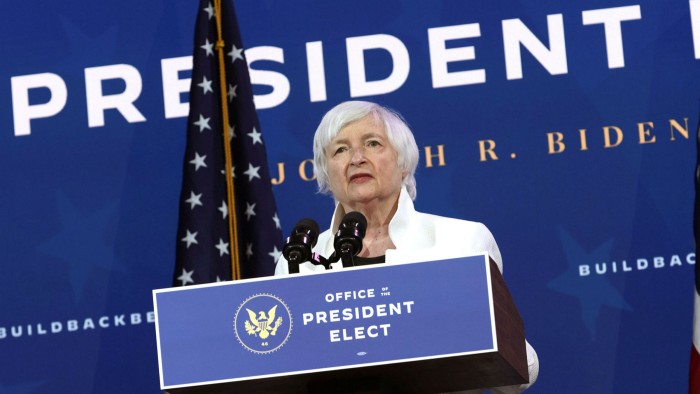Joe Biden’s new tone: respect your staff and each other


Roula Khalaf, Editor of the FT, selects her favourite stories in this weekly newsletter.
Something remarkable is happening in Washington as Joe Biden’s nominees for cabinet positions take office: they are paying tribute to the staff in their new departments and promising to protect them and their work.
I say “remarkable” but it is a sign of the depth of dysfunction during Donald Trump’s presidency that recognition of ordinary government workers, from the Treasury to the Pentagon, should be notable at all.
Perhaps these statements went unnoticed four years ago. So dominant was the wild narrative tweeted out by Mr Trump that it would have been easy to miss them.
Either way, Mr Biden has drawn a line. On January 20, he urged new White House officials to treat each other with decency and dignity, which had been “missing in a big way the last four years”.
It seems unique to the US system that incoming cabinet members publish their remarks and memos to staff. Perhaps it shouldn’t be. Not many chief executives air early promises to their people beyond an inner circle. But the Biden team has made transparency and accountability its watchwords. Announcing commitments to others publicly is one way of holding yourself to them, as married couples know.
The fact that their comments are clearly intended for publication should also make us a little sceptical, of course. Just as some marriages end in bad behaviour and divorce, many leaders act hypocritically and fail to live up to early goals. When some of Mr Biden’s team mess up, as they are bound to, they may well do so behind closed doors. Despite Mr Biden’s promise to own up to mistakes, they may try to cover up their errors or offload blame.
But taking the early evidence at face value, I see four main ways senior members of the administration and advisers are modelling the right approach — which should be copied more widely.
Setting tone from the top. Mr Biden’s comments to his new staff were not merely dutiful, they sent signals to his own team, and to their own teams.
“If you’re ever working with me and I hear you treat another colleague with disrespect, talk down to someone, I promise you I will fire you on the spot,” he memorably told his officials. “On. The. Spot.”
As management writer Daniel Pink tweeted: “On Day 1, President Biden signs executive order implementing the No As*hole Rule,” a reference to Robert Sutton’s 2007 analysis of workplace bullying and bad behaviour and its consequences for morale.
When Mr Trump was elected, I feared he would exemplify an aggressive and regressive leadership style that business people would imitate. I now hope Mr Biden will transmit beyond the White House how important it is for leaders to create psychological safety for staff — a practice well explored by Harvard’s Amy Edmondson — as a pre-requisite for strong and effective performance.
Instilling purpose. It was inevitable Mr Trump’s 2016 campaign pledge to “drain the swamp” would unsettle his alleged swamp-dwellers, making them doubt the value of their work.
Janet Yellen, new secretary of the US Treasury, took steps to reverse that perception in her Day One message to its 84,000 staff. She not only hailed their dedication and creativity but also reminded them they should see “economic policy as a way to improve people’s lives” and look for “the humanity beneath the data”. Highlighting the positive impact of people’s work on others is a great way to motivate them.
Acknowledging uncertainty. During a crisis, it makes no sense to rely on reckless certitude. Anthony Fauci, the public health expert whose discomfort serving Mr Trump was often obvious, gleefully told reporters “one of the new things in this administration is if you don’t know the answer, don’t guess: just say you don’t know the answer”.
Encouraging inclusion. Antony Blinken, whose personal commitment to the job of secretary of state is based in part on the moving story of how his family sought refuge in the US from pogroms and genocide in Europe, made a point of greeting a diverse range of state department officials on his first day last week.
Inclusion involves appealing, too, to all sides of the deep rifts in US politics and welcoming alternative opinions. He told his staff: “I’ll seek out dissenting views and listen to the experts because that’s how the best decisions are made. And I will insist that you speak and speak up without fear or favour. And I will have your back”.
That leaves one essential next step for Mr Biden’s senior officials: to turn their fine-sounding words into action. That these leaders and their staff have a heavy task, made more burdensome by the chaotic, conflict-ridden transition from Mr Trump, is obvious. There is only one way to start lightening it. To quote Mr Blinken: “Now let’s get to work.”
Twitter: @andrewtghill
Comments